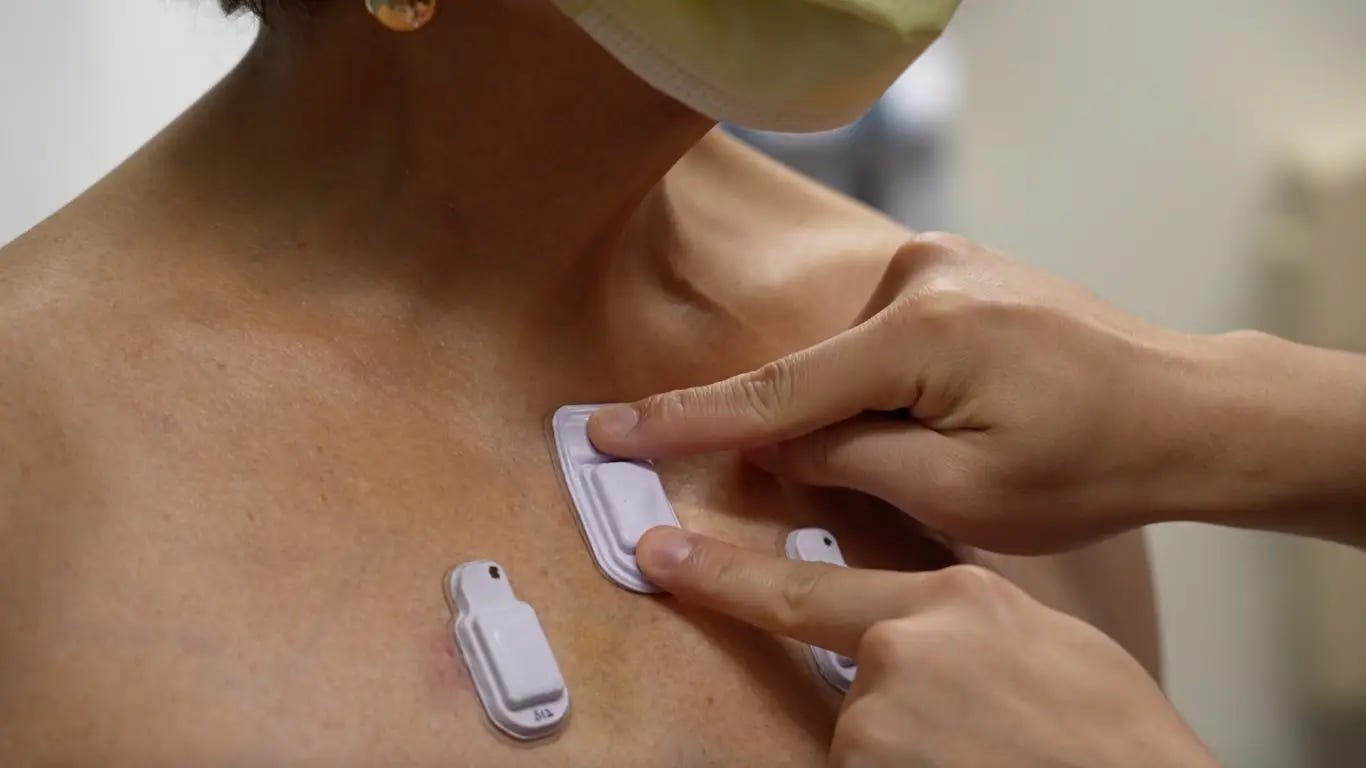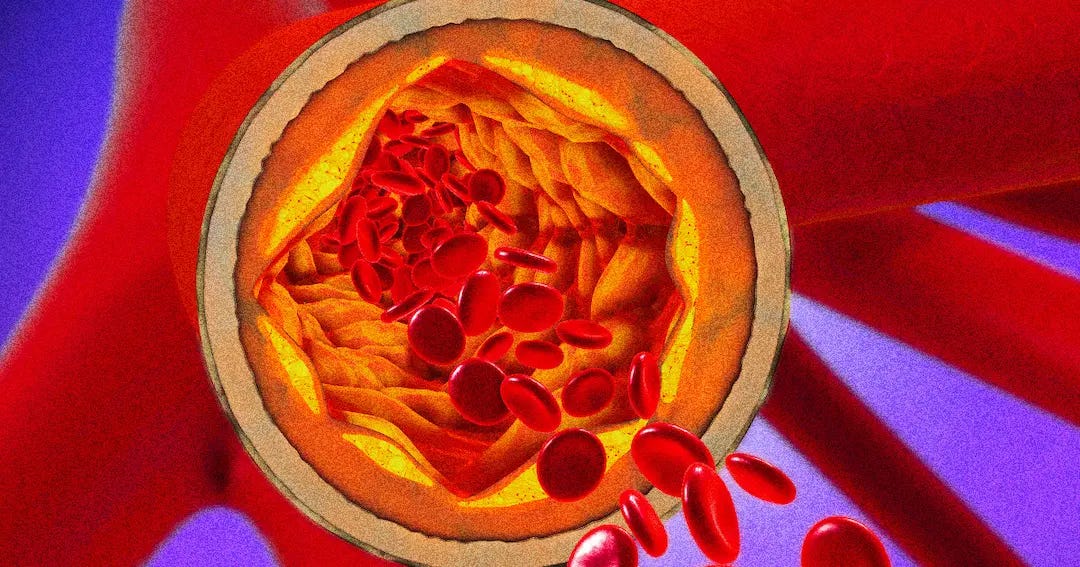Sci-Ed Update 304
Taste regulates eating, strength training & fat, gene-editing fatality, AI in teaching, wearable sound sensors, active learning vs. lecture, alchohol's journey through the body, and more!
Patient Dies After Being Gene-Edited to Have Lower Cholesterol
Researchers have been able to reduce dramatically the level of bad cholesterol in human subjects after injecting them with an experimental gene editing treatment, according to the science journal Nature, which is the first time this technique, called base editing, has been done on humans.
But at least one person died after receiving an infusion, prompting a round of safety concerns.
In the clinical trial, 10 subjects with congenitally high levels of bad cholesterol, aka low-density lipoprotein (LDL), were given an injection of VERVE-101, a gene-editing treatment that uses the base editing technique. This treatment then turned off the gene for the protein PCSK9, which is found in the liver and regulates LDL. High levels of LDL can lead to coronary heart disease.
Base editing harnesses CRISPR tools to change or edit specific portions of a gene in precise moves that avoid breaking apart DNA double strands, unlike previous gene editing techniques.
Results showed promise, with test subjects seeing their LDL cut down by as much as 55 percent after 28 days. Before the experiment, they had an average LDL of 193 mg/dL, which is sky high and can be life threatening. People should have less then 100 LDL, according to medical standards.
Six months after the injection, participants who received a high dose of VERVE 101 still enjoyed lower LDL levels.
"We don’t see that with the statin — we never see that much of a difference," said University of Pittsburgh in Pennsylvania cardiologist Ritu Thamman to Nature. Thamman was not involved in the clinical trial.
But the treatment comes with drawbacks. Participants in the trial reported a brief bout of chills, fever and headaches — as if they were going through the flu, in addition to a transient surge in liver enzyme levels.
And out of the 10 test patients, one subject died from a heart attack about five weeks after getting VERVE-101, while a second participant had a non-fatal heart attack a day after the injection. Nature did report that a safety panel of third-party experts said that the fatal heart attack was not due to VERVE-101 and they were already suffering from "advanced heart disease."
Read more→ AandP.info/dpv
Taste, Not Stomach, Regulates Eating Habits

A new study challenges the traditional understanding of appetite control. The research reveals that our sense of taste, rather than signals from the stomach, plays a critical role in regulating how much we eat.
The study found that neurons in the brainstem respond to taste perception almost immediately to control food intake, a discovery that could influence the development of more effective weight-loss drugs like Ozempic.
This new perspective on appetite control underscores the complex interplay between taste and brain signals in managing eating behavior.
Key Facts:
The study shows that taste perception, not stomach signals, primarily regulates eating behavior.
Neurons in the brainstem respond quickly to taste signals to control food intake.
The findings have implications for understanding how weight-loss drugs work and could lead to more effective treatments.
Read more→ AandP.info/sui
Lifting Weights? Your Fat Cells Would Like to Have a Word.
We all know that lifting weights can build up our muscles. But by changing the inner workings of cells, weight training may also shrink fat, according to an enlightening new study of the molecular underpinnings of resistance exercise. The study, which involved mice and people, found that after weight training, muscles create and release little bubbles of genetic material that can flow to fat cells, jump-starting processes there related to fat burning.
The results add to mounting scientific evidence that resistance exercise has unique benefits for fat loss. They also underscore how extensive and interconnected the internal effects of exercise can be.
Read more→ AandP.info/bud
Muscle: A Gripping Story by Roy Meals
Get pumped up for Episode 142, where we have the honor of hosting Dr. Roy Meals, the musculoskeletal maestro! 💪 We’re gonna flex our curiosity muscles and explore every nook and cranny of his latest masterpiece, Muscle: The Gripping Story of Strength and Movement. This episode’s so dynamic, you might need a protein shake afterward!
0:00:00 | Introduction
0:01:13 | Re-Introducing Dr. Roy Meals
0:04:08 | Muscle Strain & Why We Train
0:13:53 | What Sword Swallowing Teaches Us About Muscle
0:24:49 | Muscle Stories: Learning Should Be Fun
0:38:48 | Staying Connected
To listen to this episode, click on the play button above ⏵ (if present) or this link→ theAPprofessor.org/podcast-episode-142.html
Will AI replace the educator?
A consensus is emerging that artificial intelligence (AI) will be the key technological disruptor of our millennium, delivering new economic activity of up to $12 trillion and accounting for as much as 10 per cent of total global growth in GDP. Critically, some of this growth will arise from AI displacing or replacing human beings in the workforce.
Unlike prior technological revolutions that primarily impacted manufacturing and relatively low-skilled jobs, AI has the capacity to impact white-collar jobs. Business schools train people for such roles, so it is crucial we consider how AI will require us to reshape the traditional curriculum and learning experience to ensure students are well placed to thrive in this emerging AI-enabled world.
Read more→ AandP.info/hfe
Teachers vs. Robots | AI in Teaching
Artificial intelligence (AI) is seen by some as the emerging technology to replace teachers. Really? How should we respond?
Listen to this segment at timestamp 00:50 in The Human Microbial System | TAPP 47
To listen to this episode, click on the play button above ⏵ (if present) or this link→ theAPprofessor.org/podcast-episode-47.html
This tiny wireless wearable continuously monitors your body’s internal soundtrack

Of course, a stethoscope can only relay vitals in person based on its specific placements; long term monitoring often requires extended clinical stays alongside bulky, wired devices. To solve these problems, a team of medical experts, researchers, and engineers at Northwestern University set out to design a new wearable capable of providing highly detailed, continuous, real-time information regardless of a patient’s environment. After painlessly adhering to specific areas of the chest, the resulting soft devices not only accomplish these goals, but already show immense promise for both adults, as well as premature babies often dealing with gastrointestinal complications and apneas.
Read more→ AandP.info/elf
Which Is Better, Active Learning or Lecture? It’s Not So Simple.
Students whose STEM courses are taught using active learning perform better than those taught with traditional lectures. That was the top-line finding of a widely cited 2014 meta-analysis, and it has been borne out in many other studies since. While research suggests that lecturing remains the dominant form of STEM instruction, the studies on active learning have bolstered high-profile calls for change that a growing number of instructors have taken to heart in recent years.
A new paper suggests, however, that those studies are not as solid, nor their findings as clear-cut, as active-learning proponents would like. Its lead authors, Amedee Marchand Martella, a National Science Foundation postdoctoral research fellow in psychological and brain sciences at the University of California at Santa Barbara, and her father, Ron Martella, a professor in the College of Education at the University of Colorado at Colorado Springs, had long doubted that the evidence on active learning was strong enough to support the kinds of blanket directives — like “just stop lecturing,” — they were hearing.
Read more→ AandP.info/tr0
How Long Does It Take for Alcohol to Leave Your System?
Alcohol is a ubiquitous part of many cultures and social gatherings. But it is also a substance that can profoundly impact the human body. And it stays in your system longer than you might think.
Understanding the journey of alcohol through the body is crucial for understanding the impacts it can have on your health and for making informed decisions. So, let’s take a deeper dive into exactly how the human body processes and gets rid of alcohol, as well as the effects alcohol detox can have.
Read more→ AandP.info/g26








